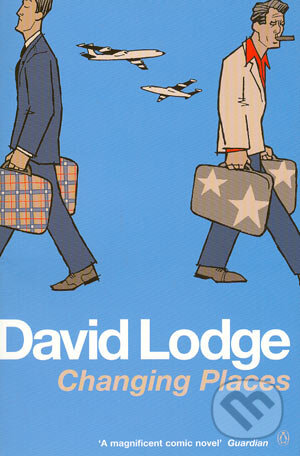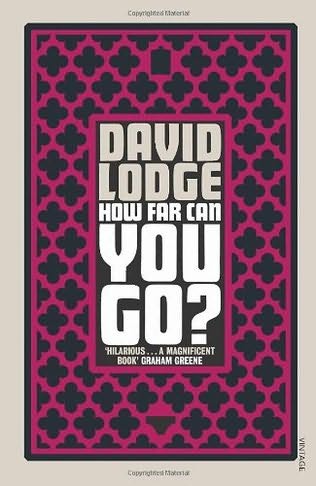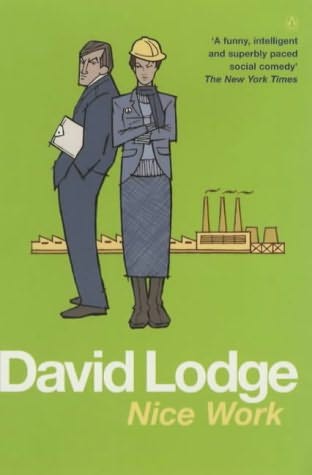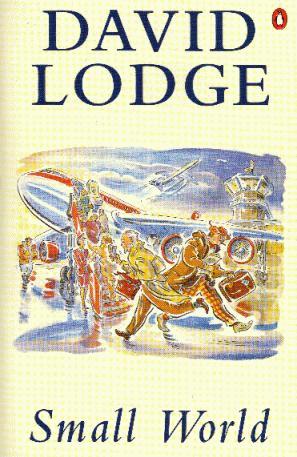
David Lodge.
Μπορεί να είναι ένας νευρωτικός, όπως ο ίδιος ομολογεί, αλλά η μεγαλοφυία του στη μετατροπή των μικρών προσωπικών τραγωδιών σε ουσία του χιούμορ του τον έχει κάνει να είναι ένας από τους καλύτερους και αγαπημένους κωμικούς συγγραφείς της Μεγάλης Βρετανίας. Σε μια συνέντευξή του στην βρετανική εφημερίδα The Observer, ο David Lodge μιλά στη Rachel Cooke για την κατάθλιψη και την κώφωσή του -το θέμα του νέου μυθιστορήματός του- και για την πίστη του στις θεραπευτικές δυνάμεις ενός γάμου που στηρίζεται στην αγάπη.

Αστεία; Δεν κάνει κανένα. Ούτε μοιάζει με τους διάσημους και πολυαγαπημένους χαρακτήρες του, τους καθηγητές Morris Zapp και Philip Swallow, οι οποίοι τείνουν να είναι λίγο καβγατζήδες.
Γεννημένος 28 Ιαν. 1935 στο νοτιοανατολικό Λονδίνο, σπούδασε στην Ακαδημία του St Joseph. Το1959 νυμφεύεται την Mary Frances Jacob. Αποφοιτά από το Πανεπιστημιακό Κολλέγιο του Λονδίνου με ένα MA. Το 1960 αρχίζει να διδάσκει Αγγλική Λογοτεχνία στο Πανεπιστήμιο του Μπέρμιγχαμ. Δημοσιεύει πρώτα το μυθιστόρημα, το The Picturegoers, για να αποτυπώσει την εμπειρία της ανατροφής του ως καθολικού. Έχει δημοσιεύσει από τότε 14 μυθιστορήματα, και δύο θεατρικά έργα. Τέσσερα βιβλία του προσαρμόστηκαν για την τηλεόραση. Το 1987 αποσύρεται για να αφιερώσει περισσότερο χρόνο στο γράψιμο.

Είναι πολυβραβευμένος, αν κρίνουμε από τον αριθμό των βραβείων που έχει πάρει: Whitbread Book of the Year για το How Far Can You Go? (1980), είχε επιλεγεί στον κατάλογο επιλέκτων υποψηφίων για το Booker Prize για το Small World (1984), είχε επιλεγεί στον κατάλογο επιλέκτων υποψηφίων για το Booker Prize για το Nice Work (1988), Royal Television Society Award για την καλύτερη δραματική σειρά για το Nice Work (1989).

Λέει: «Τα μυθιστορήματα είναι και επιχείρηση και τέχνη, και είναι πάντα και τα δύο. Πάντα λέω ότι πρέπει να είστε καλλιτέχνης όταν γράφετε ένα μυθιστόρημα, και επιχειρηματίας όταν το δημοσιεύετε - αλλά είναι αρκετά δύσκολο να κρατηθεί εκείνος ο διαχωρισμός»

Λένε: «Το τέχνασμά του –κοινό σχεδόν σε όλα τα απομνημονεύματα από τους συγγραφείς– είναι να μεταβιβάσει, χωρίς συναίσθημα ή ματαιοδοξία, την παντελή απομόνωση του μυθιστοριογράφου, οπωσδήποτε στους επαγγελματικούς όρους, από τον κόσμο που κατοικεί» (DJ Taylor στο The Year of Henry James).
 |
"Literature is mostly about having sex and not much about having children. Life is the other way round."
Birthplace
Dulwich,
Education.
Other jobs. Lodge is a well-respected academic and a leading literary critic, and has published numerous works of literary criticism alongside his novels. He was a lecturer and then professor of English at
Did you know? Lodge invented a literary parlour game called 'Humiliation' in Changing Places, which remains popular at dinner parties. Players name classics of literature that they have not read, the winner being the one who exhibits the most woeful literary lacuna. In Changing Places, Lodge's obnoxious American academic, Howard Ringbaum, admits that he has never read Hamlet - and thus wins the game (but loses his job). Lodge himself owns up to War and Peace.
Critical verdict. Lodge has won numerous awards for his books and was twice shortlisted for the Booker Prize (for Small World and Nice Work). His books have generally received generous praise from critics, though his most recent novel about Henry James, Author, Author, suffered from inevitable and unfavourable comparison with Colm Toibin's The Master. Yet even when criticising Author, Author, Alan Hollingshurst called Lodge a "sharp comic novelist", while Anthony Burgess has hailed him as "one of the best novelists of his generation".
Recommended works. The trio of
Influences. Lodge, like Adam in The British Museum is Falling Down, did his postgraduate research into the English Catholic novel. As such his influences include Evelyn Waugh and Graham Greene. Academia and sex (and its unavoidable clash with his religion) are Lodge's other great themes, which he exploits with considerable wit. The hand of Kingsley Amis's Lucky Jim is evident in the Rummidge series; while Malcolm Bradbury (whom Lodge called "my closest writer friend") and Lodge both experimented with the campus novel at the same time. Such, however, is Lodge's versatility that all his novels self-consciously betray their literary forebears. The
Now read on. Bradbury's The History Man and Eating People is Wrong will delight anyone who enjoys the Rummidge novels. Lodge's own works of criticism are excellent further reading for anyone wishing to get to grips with the complex critical issues he raises in his novels: The Practice of Writing, a collection of essays in which he considers trends in literary style and explores the work of selected writers, is a good place to start. Both Kingsley and Martin Amis would be a good bet for those who enjoy Lodge's combination of comedy, rich storytelling and literary allusiveness. Zadie Smith's On Beauty is also part-campus novel and does to Forster's Howard's End what The British Museum is Falling Down did to Ulysses.
Adaptations. Small World was made into a TV series by
Recommended biography. Focusing on Catholicism and academe, the body of Lodge's fiction reveals much about the author's life. The experiences of Adam and Barbara in The British Museum is Falling Down, for example, mirror those of the young Lodge in many respects. But although Lodge himself admits that "each of my novels corresponds to a particular phase or aspect of my own life", he is at pains to point out that "this does not mean they are autobiographical in any simple, straightforward sense".
No comments:
Post a Comment